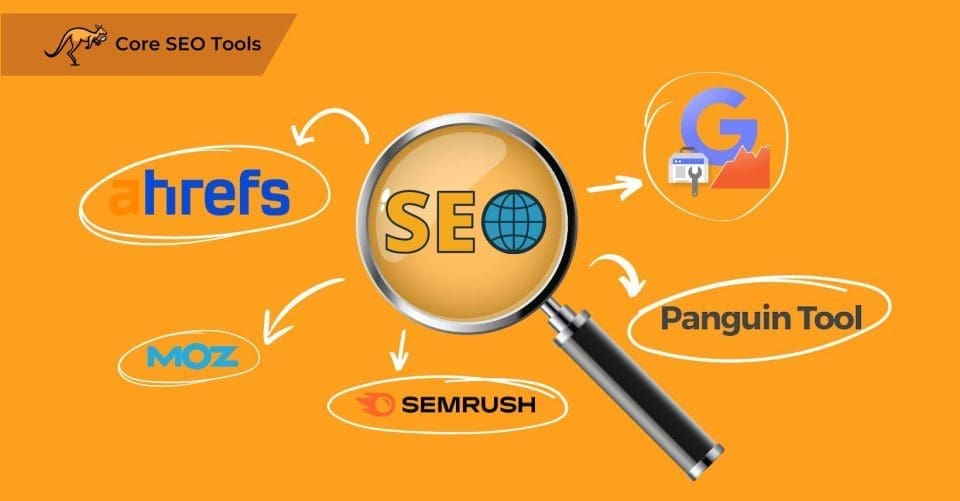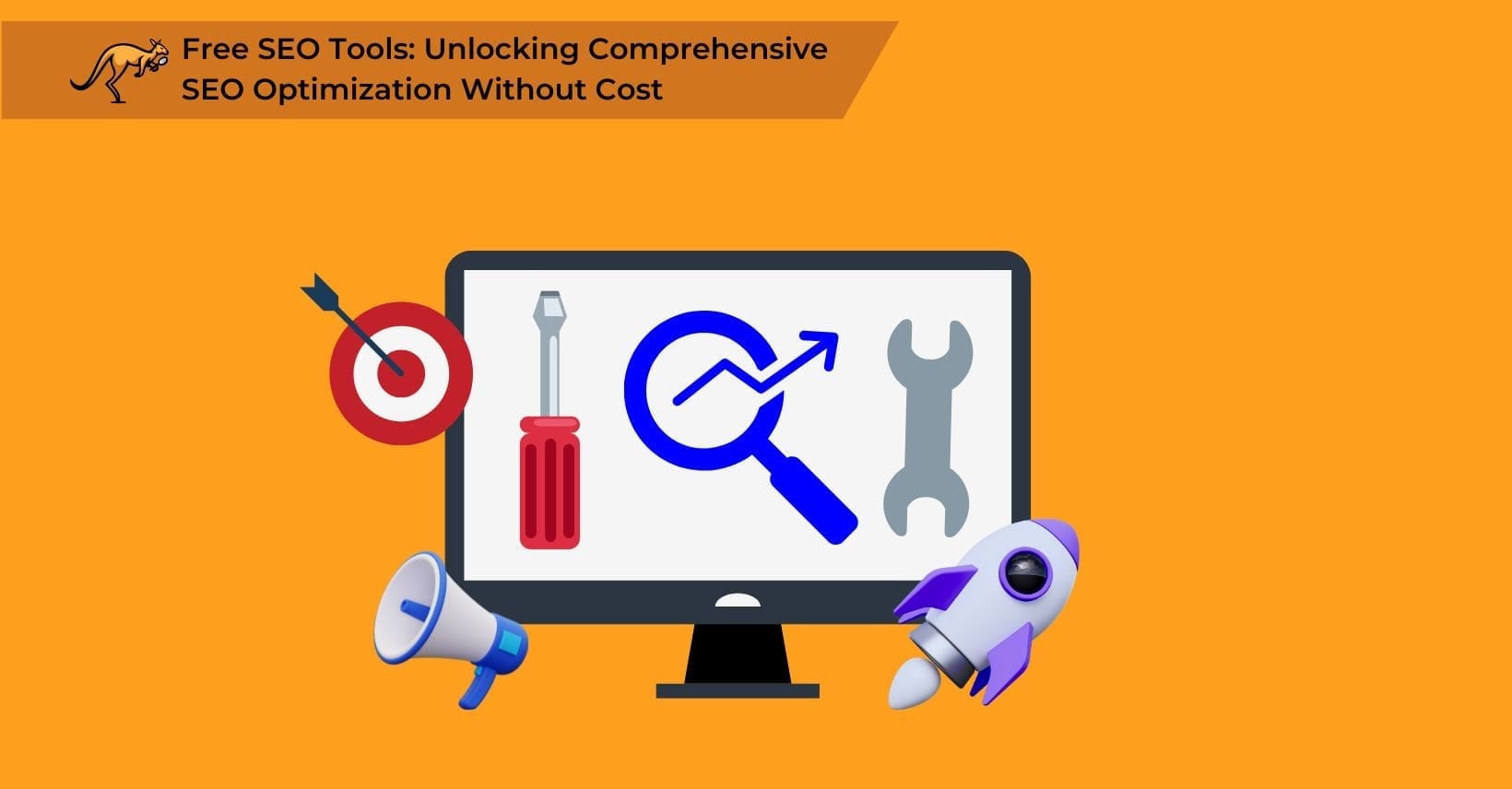Search Engine Optimization is a massive field that covers countless different strategies, techniques, and tools.
Even if you have experience with paid online ads already, SEO is an entirely different beast, requiring a completely different skillset and variety of tools to approach properly.
The basics behind SEO are fairly straightforward: optimizing your site for search engines and targeting relevant keywords can push you higher in search rankings, giving you a more prominent position in related search results.
However, that simple concept can involve dozens of steps spread across a multitude of SEO tools.
A good set of SEO tools is invaluable, no matter whether you are a long-time SEO expert or brand new to the world of SEO as a whole.
To help you find the best free SEO tools available, we have put together a comprehensive list of the 50 greatest free SEO tools – in no particular order – based on our own experience using and researching the options that deliver professional results without cost.
But before we get started with the list, we need to quickly break down why a free SEO tool option is important.
Do I Need SEO Tools?
SEO success hinges on leveraging the right tools, which are indispensable for managing the complex web of factors influencing search engine rankings.
A robust toolkit is critical for any effective SEO campaign, from tracking and measuring to adjusting strategic elements. Beginners in SEO can greatly benefit from free tools like Google Search Console, Google Analytics, and Yoast SEO that provide essential functionalities without initial investment while offering user-friendly interfaces and helpful documentation.
These tools are not just beneficial; they are often necessary, particularly on platforms like Google that offer a variety of complimentary SEO resources including Google Search Console, Google Analytics, Google Keyword Planner, Page Speed Insights, and Google Tag Manager.
This leads to the important question of how many free SEO tools one should integrate into one’s strategy to optimize effectiveness without overwhelming the process.
How Many Free SEO Tools Should I Use?
The abundance of free SEO tools offers flexibility in shaping your SEO strategy based on your specific marketing goals, the techniques you prioritize, and personal tool preferences.
While specialized tools like backlink indexers and internal link analyzers can enhance specific aspects of SEO, such as link building, not all strategies require such specialized software if overlapping functionalities exist in your existing toolkit.
This array of tools allows for a tailored approach to SEO, raising the question of their comparative effectiveness to paid versions and whether free SEO tools are sufficient for achieving your digital marketing objectives.
Are Free SEO Tools Better?
Free SEO tools offer a cost-effective solution for businesses, particularly small ones with constrained budgets, enabling them to explore and apply various SEO strategies without financial commitment, while paid tools typically provide more data, advanced features, and fewer usage limitations than their free counterparts.
These tools provide a valuable introduction to SEO functionalities, enabling more informed decisions about potential investments in comprehensive SEO platforms.
As businesses expand their SEO toolkit, discovering the right tools becomes crucial.
This leads seamlessly into exploring the Best Free SEO Tools, where businesses can find a curated list of resources that maximize SEO effectiveness without impacting their budget.
50 Best Free SEO Tools
Here is our list of the 50 best free SEO tools available, all quickly explained so that you can pick the right tools for each job.
If you need free SEO tools with no hidden charges or questionable quality, including both downloadable software like Screaming Frog SEO Spider and online tools, then this list should be the perfect place to look.
This list is in no particular order, and no business will need all of these tools to succeed – choose the free SEO tools that suit your needs best, and do not be afraid to explore more options until you find the combination that works right for you.
Core SEO Tools

The basics of SEO often require at least a few tools to handle effectively.
While some are obviously more important than others, there are a handful of tools that you might as well use regardless of your SEO goals.
These are tools that are either too useful to ignore or fill a niche that nothing else quite does, making them invaluable for basically any SEO project.
1) Google Search Console
Google Search Console is a core part of any SEO plan, letting you measure organic search traffic and your site’s overall performance in search engine results.
The whole of Google Search Console is meant as a tool for handling your various SEO metrics, from local business SEO performance to organic search volume.
Often used as the central point of a larger SEO strategy, Google Search Console uses the same free account system as other Google Search tools.
Whilst it is great for keeping track of SEO metrics like monthly search volume and organic traffic demographics, it also works well alongside a range of other tools.
For example, Google Search Console can be used to measure local business search volume and local organic traffic results, helping you refine your rankings in local searches through a variety of other tools.
2) Google Analytics
Google Analytics is a vital tool for SEO on Google, listing information about your site, such as traffic sources, demographics, site visits, and a range of other analytics information.
Google Analytics is easily one of the best free SEO tools primarily because of how necessary it is, allowing you to properly manage your SEO on Google by working with real analytics data instead of assumptions.
Since Google Analytics is entirely free, it is incredibly easy to start using at basically any point.
This makes it a must-have for basically any business attempting SEO since Google is easily the most important platform to rank highly on.
In a way, even including Google Analytics on this list is not necessary because most businesses will need to use Google Analytics at one point or another to manage their site.
However, as one of your most important SEO tools overall, Google Analytics is absolutely worth using as soon as possible.
3) Looker Studio
Formerly known as Google Data Studio, Looker Studio allows you to merge data from multiple sources and tools, including Google Analytics and Google Search Console.
This can be a good way to get a full visual breakdown of the data these tools provide without having to piece it all together yourself.
While Looker Studio can take a while to learn, there are beginner’s guides that can help you understand how they are meant to be used.
As a free SEO tool, there is no harm in taking a look at the platform to see if it can help with your overall SEO goals.
4) MozCast
MozCast is a Moz tool that tracks changes to Google’s search algorithms, allowing you to get an idea of how much might have changed between two periods of time. Moz offers several free SEO tools including MozCast, MozBar, and Moz Link Explorer that provide valuable insights for keyword research, backlink analysis, and algorithm tracking.
This can be extremely important for knowing when you might have to double-check and update your SEO efforts since these algorithm changes can mean that specific SEO techniques are no longer as effective or require different steps to perform properly.
MozCast needs other tools alongside it to be fully effective, but it is still a valuable free tool for tracking the major changes to Google’s algorithms.
This helps with understanding when you may need to take additional steps to keep your SEO on target.
5) Ahrefs
Ahrefs is a bit more niche than other tools, focusing specifically on backlink analysis and other related metrics.
However, since these metrics are incredibly important for link building and related strategies, having a solid backlink analysis tool is a vital step to take for almost anyone.
Ahrefs can also work as one of your business’ technical SEO tools and can help with a wide range of SEO tasks related to both your web pages and the links pointing back at them.
Beyond this, Ahrefs is easily one of the most famous free keyword research tools.
It can even provide competitive analysis options to help you break down the strategies and links that your competitors are using.
This makes it a solid all-round SEO tool that is definitely worth using, regardless of your site’s niche.
6) Panguin Tool
Barracuda Digital’s Panguin Tool is a similar tool to MozCast, lining up your search traffic with changes to Google’s algorithm.
This lets you see whether or not those algorithm changes have damaged your SEO performance.
While simple, this is a great free tool for quickly telling whether or not you are having issues as a result of algorithm changes.
This alone can make it a valuable choice for basically any business, especially if your entire focus is on Google, and a single algorithm change could throw your SEO plan off-balance.
7) MozBar
MozBar is possibly the most famous tool that Moz has created, and for good reason.
MozBar is a free SEO tool that allows you to quickly see any page’s Page Authority and Domain Authority at a glance through a Chrome extension, as well as its Spam Score.
While MozBar effectively does the same job as an authority checker tool, the fact that it is a browser extension makes it a very easy-to-use option for quickly checking these statistics on any page you visit.
8) Bing Webmaster Tools
The Bing Webmaster Tools are a necessary SEO tool if you plan to target Bing.
These tools provide you with a range of important SEO features, such as keyword research tools and backlink tracking options.
Since it is tied into Bing itself, it is the easiest way to gather these stats through Bing directly.
These free tools are perfect for things like generating reports based on accurate data or for tracking the performance of your individual sites on Bing as a whole.
Like other platform-specific analytics tools, Bing Webmaster Tools are basically necessary if you want to succeed on Bing, so they are worth using even if Bing is not your primary focus.
9) SEMRush
SEMRush is another varied and reliable SEO tool that can provide a good range of features, from position tracking and site audit options to writing assistance and content templates.
For many people, this makes SEMRush a must-have free SEO tool.
While SEMRush offers a range of paid features as well, its free trial features are perfectly capable of getting the job done.
If you do decide to go for a paid account, SEMRush also has a number of payment plans for businesses, meaning that you can upgrade to whatever level is comfortable for your budget.
The various features offered by SEMRush make it a fantastic free SEO tool for a wide range of marketing needs, which can make it invaluable if you want to create a diverse and varied SEO campaign.
10) Quick Click Website Audit
Quick Click is a simple tool that allows you to quickly extract a page’s URL and feed it to another tool, with support for a wide range of selected SEO tools.
This basically gives you a streamlined way to dump any page you want into over two dozen different tools in only a single click.
While this is not much more than a shortcut around something you could already do, Quick Click does save you the time and hassle involved in manually copying and pasting page URLs over and over again.
11) Screaming Frog SEO Spider
Screaming Frog crawls your website for SEO errors, such as header issues or problems with excessive HTML.
While this might sound simple, it is because the Screaming Frog SEO Spider is ideal as a general auditing tool.
The spider is able to crawl a huge amount of URLs at once with minimal user input required.
While there is a paid version of the tool, the free version of this spider can still crawl up to 500 URLs at once.
Even at its most basic, Screaming Frog’s spider tool is one of the best options for crawling URLs quickly and effectively in a variety of contexts and situations.
Analysis Tools
12) Screaming Frog Log File Analyzer
Alongside the spider is the Screaming Frog Log File Analyzer.
This tool analyzes your log files to give you greater URL insight and tell you which pages bots are able to crawl.
While this is a very niche tool for many people, it can also be important if you are trying to optimize your site to a very granular degree.
Being able to see which pages will get crawled can be important for making the right SEO choices, and you can even download data on things like page speed or broken links that could be affecting where bots go.
13) SERPROBOT
SERPROBOT is a free search engine results page checker that offers automatic checking and alerts, allowing you to get regular updates about your performance on search engines.
The tool can also provide visual representations of how your performance has changed and can allow you to quickly see whether or not you are starting to lose traction in particular niches.
14) Google Mobile Friendly Test
The Mobile Friendly Test lets you quickly see if your site is mobile-friendly, as the name suggests.
There is not much else to say about this tool, but it is something that can really help with larger-scale SEO changes.
15) SpeedMonitor.io
SpeedMonitor is a site speed checker that keeps track of any site’s overall speed, including the site speed of your competitors.
16) Web Vitals
Web Vitals is a GitHub extension that measures important factors in your site’s performance, from loading and interactivity to other deeper metrics.
17) Woorank
Woorank is a free website analysis tool that allows you to get a general SEO score for your site, as well as a checklist of potential steps you can take to fix identified SEO problems, making it one of several free optimization tools available for comprehensive website analysis.
The Social Shareability feature also gives you an idea of how likely your site is to be shared, providing social media data that can be really important for multi-channel marketing and SEO.
Keyword Research Tools
Keyword research is important for SEO at any level, so having the right tools on hand can make a huge difference.
18) Google Trends
Google Trends provides useful information on a range of calories and search types, letting you see the interest in specific terms from as far back as 2004.
When used alongside other keyword tools, this can be a good way of seeing which keyword suggestions are gaining traction and becoming more popular over time.
This includes those that you might simply have completely overlooked.
Even better, Google Trends can work across a range of countries, which makes it even easier for multinational sites or businesses to target terms that non-local audiences are interested in.
19) Google Keyword Planner
Google Keyword Planner is easily the most important free keyword research tool you will have access to.
Designed for ad campaigns, first and foremost, Google Keyword Planner also works fantastically as an SEO tool.
While it might be simple compared to other Google tools, Google’s Keyword Planner has the advantage of being a Google tool.
This means that it takes data directly from Google’s search results rather than extrapolating through estimates or third-party data sources.
20) Ubersuggest
Ubersuggest scrapes data directly from Google Keyword Planner to provide more keyword ideas to users, as well as includes features like CPC and search volume information.
In general, Ubersuggest is much more focused on getting keywords for content rather than ads.
This makes Ubersuggest a great option for SEO, especially with the feature of being able to filter out keywords that you have no interest in.
It also recently gained a feature that lets you input a competitor’s URL to gain keywords based on their niches and current SEO strategy.
Overall, Ubersuggest is a fairly powerful tool that can do quite a lot with very little effort required, using Keyword Planner’s data to suggest SEO-friendly content keywords.
21) CanIRank?
CanIRank allows you to find out if you can rank on the first page of a certain keyword, displaying the probability that you will rank for the term and suggesting ways to push yourself higher.
Ideal as a competitive analysis tool, CanIRank makes it easy to see whether or not certain keywords are worth targeting.
This also makes it a valuable free tool for seeing whether or not a certain SEO tactic is actually going to be worth trying, especially if it involves a lot of new keywords.
22) Exploding Topics
Exploding Topics works similarly to Google Trends, focusing on rapidly growing topics that have not yet taken off to the point that they are a competitive SEO environment.
This can help you find potential keyword ideas long before bigger competitors arrive to take them over.
As a keyword tool, Exploding Topics works best in guiding you to related keywords that have not become an SEO battleground yet.
23) AnswerThePublic
AnswerThePublic provides important information about what kind of searches users make.
Inputting a keyword brings back a list of popular search queries related to what users are searching, giving you an understanding of how users are generally making their searches.
Not only does this become important for keyword research, but it also serves as a way to get keyword suggestions in itself.
The graphics that ATP produces are also useful for making reports if needed and can be a quick way to break down the searches that users tend to make when dealing with specific keywords or subject matters.
24) Keyword Explorer
Keyword Explorer is a simple keyword research tool that can provide up to 1,000 keyword suggestions for free, with 10 searches per month.
This also includes information like clickthrough rate and difficulty score, which can be helpful for picking the right keywords to target.
While simple, Keyword Explorer is another tool that never hurts and can easily become a useful tool for general-purpose keyword gathering.
25) Keywords Everywhere
Keywords Everywhere is another free keyword research tool that provides important data on a huge number of sites, giving you an easy way to interpret a domain’s keyword success – whether it is your own or a competitor’s.
Not only does it give you details on search volume, but it can also display information about every single search you make, giving you the information right on your browser rather than through an entirely new platform.
26) Also Asked
Also Asked is a simple option that gives you information on what questions users are asking relevant to certain keywords, basically giving you an idea of what FAQs to include in your own content.
While free users can only claim three searches, this can still be a good option for any pages that you absolutely need to optimize as effectively as possible.
This makes it a fairly useful keyword research tool for finding keyword ideas beyond the obvious options. especially for a marketing consultant seeking to expand their client’s online presence.
27) KWFinder
KWFinder isolates long-tail keywords, providing a strategic advantage for those targeting niche markets or specific product offerings.
This tool simplifies pinpointing lucrative keyword opportunities that can elevate a specialized business’s visibility in search engine results.
By efficiently identifying these less competitive keywords, KWFinder optimizes your keyword strategy and seamlessly integrates with broader SEO efforts.
This comprehensive approach to keyword discovery complements technical SEO tools, which further refine and enhance a website’s infrastructure for optimal search engine recognition.
Technical SEO Tools
Free technical SEO tools like BROWSEO, Robots.txt Generator, XML Sitemaps Tool, and Chrome DevTools help webmasters optimize site structure, crawlability, and performance without requiring paid subscriptions.
28) BROWSEO
BROWSEO lets you see how your site appears to search engines when they are crawling it, effectively stripping away any visual flair and stylings to give you an understanding of what bots are actually seeing.
This can be especially important for understanding how sites are being crawled.
It also features a SERP preview, allowing you to see how the site appears to users when they find it in search engines.
Unlike the regular mode, this is purely for seeing how the titles, descriptions, and other meta tags look to a potential visitor or customer.
29) Robots.txt Generator
The Robots.txt Generator is exactly what it sounds like – a tool to let you generate a Robots.txt file so that bots know how to move around your site and how to crawl specific sections “correctly.”
More importantly, this makes it easy to exclude certain URLs from being crawled, something that can be extremely important in SEO but is often overlooked because of how complex it can be to first-timers.
30) XML Sitemaps Tool
The XML sitemaps tool provides an easy way of creating a site map with up to 500 pages, requiring no costs or registration.
This tool only does one thing, but it is such an important part of many sites that it is still a valuable asset to have when you are working on your site’s technical SEO issues.
31) SEOWL Google Title Rewrite Checker
The Google Title Rewrite Checker lets you see if Google is rewriting your titles – for example, moving the site’s brand name to the end. This can impact click-through rates, so knowing if it happens is important.
As another single-purpose tool, the SEOWL GTRC is still important for getting the most out of your technical SEO audit.
32) Chrome DevTools
Chrome DevTools offers real-time page editing capabilities within Google Chrome, enhancing your ability to promptly identify and resolve site issues.
This tool exemplifies the seamless integration of development utilities in a browser environment, directly influencing how efficiently developers and SEO professionals manage website diagnostics.
As we transition from troubleshooting with Chrome DevTools to enhancing SEO strategies, the focus shifts to sophisticated link-building and management tools, which are crucial for strengthening site architecture and boosting search engine visibility.
Link Building and Management Tools
There are a lot of free link tools out there to choose from, whether they are meant for link building or management of existing links. Free SEO tools for link building include Ahrefs Backlink Checker, Check My Links, and Moz Link Explorer, which help identify linking opportunities, analyze competitors’ backlinks, and manage your existing link profile.
33) Ahrefs Backlink Checker
The Ahrefs Backlinks checker is an all-purpose tool for breaking down the details behind a URL’s backlinks, from the number of referring domains to the total number of backlinks overall.
While the free account version of this tool is weaker than the paid one, for obvious reasons, it can still be a powerful tool that is worth exploring.
34) Check My Links
Check My Links is a Google Chrome extension that crawls your site and identifies the status of each link, from valid links to redirects to entirely broken links.
This can be useful for checking that the links on your site are actually functioning or even for finding broken links and fixing them quickly.
This is a relatively basic tool, but the fact that it is a Chrome extension makes it fairly easy to use in a variety of different ways.
It also means that it is a free SEO tool that can be used with no training or learning required whatsoever.
35) Moz Link Explorer
Moz Link Explorer allows for easy exploration of a site’s backlink profile, along with its domain authority and the domain authority of any links they are receiving.
This can be important for multiple link building efforts, whether you are trying to boost your own backlink profile or want to capture the incoming links of a competitor.
36) Linkio Anchor Text Suggestion Tool
The Anchor Text Suggestion Tool provides a tailored approach to SEO, enabling the generation of relevant keywords suitable as anchor texts for internal and external links.
By inputting specific keywords or your brand name, this tool employs various filters and anchor type settings to convert initial keywords into optimized anchor text solutions.
This method of refining anchor texts is part of a broader suite of SEO strategies, seamlessly leading into exploring additional SEO tools that further enhance your website’s optimization and online presence.
Other SEO Tools
With so many different free SEO tools out there to choose from, it is hard to keep track of them all and place them into different categories. Here is every other keyword tool, Google search analysis option, and SEO strategy-builder that we recommend.
37) Google Business Profile
Creating a Google Business Profile helps you connect with users across both Google Search results and Google Maps, allowing for much more effective local SEO.
Google Maps integration also means that users are able to find your physical business much faster, which can potentially capture users who otherwise would not be interested.
38) Moz Local Check Business Listing
The Moz Local Check Business Listing tool allows you to check that your site appears correctly on directories across the internet, from your Google Business Profile to completely unrelated platforms.
39) Cloudflare
Cloudflare is a content delivery network that aims to speed up loading times by hosting your site through whichever servers are closest to individual users.
This massively reduces wait times by hopping to whichever server IP address would load fastest for them.
40) SEO Minion
SEO minion allows for on-page SEO analysis work and a full SERP preview – as well as several other core features – all set up through a Chrome extension.
This makes it a fairly strong tool for anybody who uses Chrome regularly, skipping the need to have several different tools all open at once.
41) Dareboost
Dareboost is an SEO audit tool that breaks down your site’s technical SEO performance, content, and overall popularity online.
42) Google Counting Characters
Google’s Counting Characters is meant to help with writing meta titles and meta descriptions, providing a word and pixel count to show whether the meta description or title will be cut off on search engines.
This is useful when trying to optimize your structured data and meta tags, ensuring that they are not wasted by the pixel limitations of SERPs.
43) Ryte Structured Data Helper
The Ryte Structured Data Helper makes it easier to create and validate your structured data schema markup, which works well alongside optimized meta description and meta title details.
44) Google Tag Manager
The Google Tag Manager allows a site owner to edit their tags without having to actually edit any code.
This is another simple but effective tool that does a single job incredibly well.
45) BuzzSumo
BuzzSumo is a keyword research tool and a content tool that breaks down which kinds of content suit that keyword best and who the influences are for topics like that.
While not a conventional keyword research tool, this can still be invaluable for overall keyword research, telling you which kinds of content (and which partnerships or sponsored posts) to pursue.
46) Page Speed Insights
Page Speed Insights gives you a breakdown of your page loading speed, as well as suggestions on how to improve it.
47) Disavow Tool
Google’s Disavow tool makes it easy to disavow links that are damaging your backlink profile, making it incredibly easy to cull anything that could be harming your position in search results.
48) SendPulse
SendPulse is a tool meant for setting up chain emails, SMS messages, and other kinds of multi-channel notifications based on certain factors, such as user’s actions on your site.
49) Yoast SEO
Yoast SEO is an SEO suite for WordPress that provides important SEO analysis and management tools, making it easier to handle a lot of search engine optimization tasks properly.
50) Bulk Google Rank Checker
Numerous tools provide bulk rank checking, each offering the advantage of swiftly and comprehensively understanding your search engine rankings within the broader SEO landscape.
Free SEO tracking software like SERPROBOT, Google Search Console, and Bulk Google Rank Checker allows webmasters to monitor rankings, traffic, and performance metrics without subscription costs.
These tools simplify the complex task of monitoring where you stand in search results, which is important for strategic planning and optimization. With the abundance of available options, the next logical step is to identify which tools are accessible without cost.
This leads us to explore which free tools you should use to maximize your SEO efforts efficiently.
Which Free Tools Should I Use?
While there is no definitive list of essential free SEO tools, exploring those available without charge is highly beneficial.
This approach conserves financial resources and prepares you for situations where investing in a premium tool becomes inevitable.
Understanding the features and limitations of free tools can significantly enhance your SEO strategy.
Now, let’s discover the best free SEO tool that aligns with your specific needs and helps optimize your online presence effectively.
Finding the Best Free SEO Tool
The “best” tools are the ones that solve your problems fastest.
Consider your own current issues, the kind of fixes you might need, and the amount of effort it could take to resolve them manually without a tool to assist you.
For example, a simple WordPress SEO plugin to help with managing keywords might not seem that important – but it might be the exact fix your current SEO plan needs.
Should I Always Use Free SEO Tools?
Investing in paid SEO tools can enhance your digital marketing strategy, but balancing cost with benefit is crucial. Opting for one or two essential paid tools can optimize your SEO efforts without straining your budget.
However, not all tools necessitate financial commitment—many effective alternatives offer free versions that can achieve comparable results.
This economical approach in selecting SEO tools leads us to explore frequently asked questions about free SEO tools, providing insights on maximizing SEO performance without significant investment.
Free SEO Tools FAQ
Is SEO free?
If you have absolutely no budget, it is possible to approach SEO from an almost entirely free perspective.
However, you would need to choose your tools carefully because many will have strong limitations behind them.
Is SEO completely free?
Technically, SEO is entirely free.
In practical terms, SEO often has at least a few costs involved in it, whether that is for specific tools or deals with outside SEO experts.
How do I find low competition keywords for free?
Many of the keyword research tool options listed here allow you to get details like keyword difficulty and search volume.
This can make it easy to pick out worthwhile keywords without having to pay anything at all.
These can also be useful as seed keywords, allowing you to generate more keywords from the original seed keywords using other tools in this list.
Can I do SEO by myself?
With the right tools – from simple things like keyword planners and keyword difficulty checkers to XML sitemap generators and link redirect trace tools – SEO can be an entirely in-house process.
With so many different tools to choose from, it all depends on how you approach SEO itself.
Are Google’s Free SEO Tools Worth Using?
Google’s SEO tools are essential for any SEO strategy, providing a crucial foundation for enhancing your website’s visibility and search rankings.
These tools, integral for businesses of all sizes, help navigate the complexities of SEO and are a starting point for refining your digital marketing approach. Harnessing the power of these tools effectively propels your business toward achieving optimal search engine results.
As discussed in our final insights, this strategic use of Google’s resources sets the stage for exploring broader aspects of maximizing SEO success with free tools.
Final Insights: Maximizing SEO Success with Free Tools
The landscape of SEO is vast and varied, offering many tools ranging from entirely free solutions to premium services. While free SEO tools provide a fantastic starting point for newcomers and a cost-effective option for seasoned marketers, their limitations suggest a combined approach with paid tools for optimal results. Ultimately, the choice of tools should align with your specific SEO goals, financial constraints, and the particular demands of your marketing strategy. As you navigate through these decisions, remember that integrating the right tools is crucial for enhancing your online visibility and achieving sustained search engine ranking success. Whether you opt for free tools or invest in more advanced solutions, the key is continuously adapting and refining your approach to stay ahead in the dynamic world of SEO.





